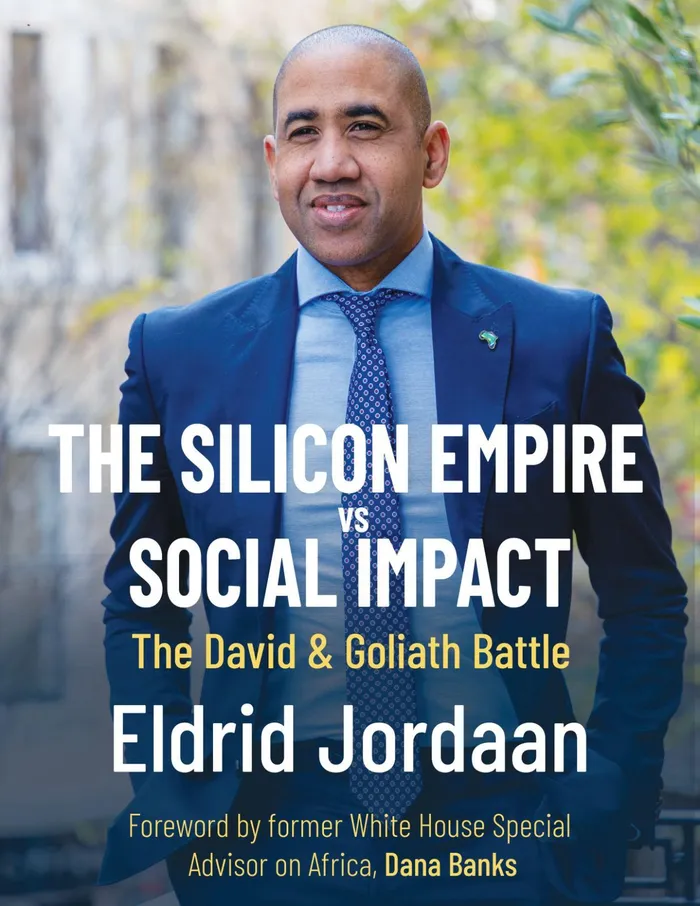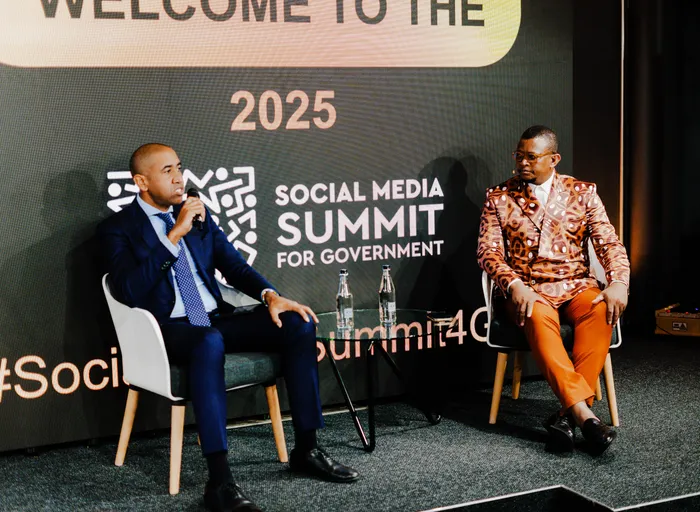
The Silicon Empire vs Social Impact is both a narrative of resistance and a roadmap for change. It challenges the reader to reconsider the nature of digital power, the role of civic technology, and the urgent need for policy interventions that centre people over platforms.
Image: Supplied
Author: Professor Eldrid Jordaan
The global digital economy is increasingly dominated by a small group of powerful technology corporations, whose platforms now act as essential infrastructure for communication, commerce, and governance. In this landscape, access to digital platforms is no longer optional, it is foundational to public service delivery, democratic participation, and economic inclusion. In The Silicon Empire vs Social Impact: The David and Goliath Battle, Prof. Eldrid Jordaan presents a groundbreaking account of how one civic technology startup in South Africa stood up to one of the world’s most powerful digital empires.
This book documents the legal struggle between GovChat, a mission-driven platform focused on citizen engagement, and Meta, the parent company of Facebook and WhatsApp. Through this case, the author exposes the systemic risks posed by unregulated digital monopolies and makes a compelling case for global reforms in platform governance, data access, and digital competition.
GovChat was developed as a public engagement platform to strengthen the relationship between citizens and the state. Built in partnership with South Africa’s government, it enabled millions of citizens to access information, report service issues, and apply for government grants. During the COVID-19 pandemic, the platform became a lifeline for over 15 million South Africans, offering rapid access to social relief, health updates, and essential services through a WhatsApp-based interface.
In late 2020, Meta attempted to offboard GovChat from its WhatsApp Business API, claiming policy violations. This action would have effectively shut down the platform’s ability to communicate with citizens and deliver public services. The move triggered a landmark legal battle in which GovChat challenged Meta at the South African Competition Commission and Competition Tribunal.
The case, unprecedented in its nature, raised global questions about platform dominance, fair access, and the responsibilities of Big Tech companies operating in emerging markets.
The book goes beyond legal proceedings to explore five major themes shaping the digital age:
Dominant digital platforms are no longer neutral conduits. They serve as powerful gatekeepers that decide who gets access to digital infrastructure and under what terms. The case illustrates how such unchecked control can be used to stifle innovation and suppress public-interest technologies.
As countries increasingly rely on private technology companies for the delivery of public services, national sovereignty becomes entangled with corporate policy. The book argues that digital sovereignty must become a global priority and that governments need enforceable frameworks to protect their autonomy and citizen rights in the digital space.
GovChat’s journey demonstrates that civic tech platforms are not peripheral experiments, they are foundational digital utilities. The book documents how GovChat reached underserved populations, amplified citizen voices, and provided a model for inclusive digital transformation.
The case challenges the adequacy of existing competition laws in addressing digital exclusion. The book proposes the creation of a Global Digital Competition Compact, encouraging cross-border cooperation among regulators and a redefinition of fair access in the platform economy.
Embedded within the legal and policy analysis are powerful human stories. The book recounts how GovChat helped enable unemployed youth to access social relief, and gave marginalised communities a voice in the public sphere. These narratives remind us that the stakes of digital exclusion are deeply human and immediate.
While rooted in the South African context, the book speaks to a global audience. The issues it raises: platform monopolisation, data access, economic dependency on digital gatekeepers are echoed in countries around the world.
Prof. Jordaan uses the GovChat experience to illustrate the need for a new digital policy agenda. He calls for action from governments, civil society, regulators, and multilateral institutions to create interoperable digital infrastructure, fair platform access rules, and protections for public-good innovation.
The book is also a call to investors and the private sector to support social impact technologies that are grounded in purpose and inclusion.
The Silicon Empire vs Social Impact is both a narrative of resistance and a roadmap for change. It challenges the reader to reconsider the nature of digital power, the role of civic technology, and the urgent need for policy interventions that centre people over platforms.
Prof. Eldrid Jordaan: technologist, public leader, and founder of both GovChat and Suppple PLC writes with firsthand experience of navigating the complex intersection of innovation, regulation, and social justice.
This is not just a South African story. It is a global signal that the digital future must be governed in the public interest.

GovChat founder Professor Eldrid Jordaan speaking at the Social Media Summit for Government at the University of Johannesburg, in conversation with DeCode Communications CEO Lorato Tshenkeng.
Image: Supplied
The moment Meta tried to off-board us, they exposed a fault line in the global tech landscape. It wasn’t about South Africa. It wasn’t about GovChat. It was about the imbalance of power that has defined this era of digital expansion, an imbalance where a small group of companies hold an outsized say in how societies communicate, organise, and engage with their institutions.
It was about creating a line in the sand: that no matter how large or globally entrenched a tech company is, it doesn’t get to decide which public services people can or can’t access. Not without oversight. Not without consequence. We talk about sovereignty in the political sense. But there’s a digital version too. Who owns the tools? Who sets the protocols? Who decides who gets to build and who gets erased?
This isn’t an abstract question. It’s one that affects how children access education in remote provinces. How job seekers apply for relief. How citizens report corruption, or check on the safety of their neighbourhoods. These aren’t fringe concerns. They are the very fabric of daily life. And increasingly, they are mediated by code and controlled by corporations. When we filed our case with the Competition Commission and the Tribunal, we did so knowing we were stepping into uncharted territory. No one in South Africa had ever brought this kind of challenge against a platform like Meta. But we weren’t just looking for a technical ruling. We were asking the country and the world to consider something bigger: what happens when public infrastructure depends on private permission? The answer, as we’ve seen, isn’t always comfortable. But that’s precisely why it matters.
This book will unpack what happened behind the scenes. The details, legal arguments, political calculations. The moments of disbelief, of resolve, of knowing that we were no longer fighting for a product, we were fighting for the principle behind it. This is a story about David versus a Goliath. Beyond that, it’s about a generational battle between civic purpose and platform power. Between sovereignty and centralisation. Between those who serve and those who sell. We didn’t start this fight. But once we saw the terrain, we knew we had to take a stand. One that could protect future platforms like ours from being erased before they ever had a chance to make a difference.